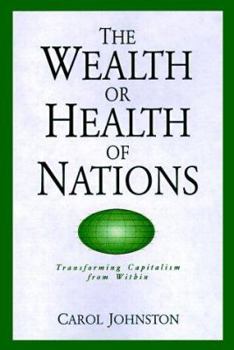The Wealth or Health of Nations: Transforming Capitalism from Within
Asking why Western society has become so focused on money, the author explores how Western economic theory has developed and examines theories from Adam Smith to Milton Friedman. She then offers a... This description may be from another edition of this product.
Format:Paperback
Language:English
ISBN:0829812474
ISBN13:9780829812473
Release Date:January 1998
Publisher:Pilgrim Press
Length:144 Pages
Weight:0.66 lbs.
Dimensions:0.5" x 6.0" x 9.0"
Customer Reviews
3 ratings
If you haven't got your health...
Published by Thriftbooks.com User , 21 years ago
Carol Johnston, an assistant professor at my seminary, for years directed the Faith, Wealth and Leadership project, from which this text derives. Johnston gives an overview of the major strands of economic thought over the past few centuries with particular attention to the theological implications of these theories. Economic theories from Adam Smith, Thomas Malthus, John Stuart Mill, Karl Marx, Alfred Marshall, John Maynard Keynes and Milton Friedman are laid out in historical progression, showing the development of economic systems and culture. As theologian John Cobb Jr. says in the foreword, the scope of economic thinking in theological and religious circles rarely extends beyond the capitalism/socialism duality, but there is much more to investigate, and much more at stake as modern economic systems seem to be reaching a saturation point around the world.Economists such as Smith, Malthus, and Mill had ideas that are worth considering and incorporating, but are inadequate in and of themselves for modern global economic scales. Marxism sought a refocus that ultimately failed as a pure system, while influencing (to a greater degree than most Western politicals and economists like to admit) current economic systems. The more recent Keynesian and Friedman models still focus upon growth, production and wealth to the exclusion of (or ignoring of) sustainability in simple ecological terms.Johnston likens modern capitalism to the situation with the Sorcerer's apprentice, who, upon using his magic to make life easier, finds the system taking a life of its own, refusing to be shut off. Modern capitalism has a very single-minded focus -- a spiralling cycle of production and consumption -- and the drive to ever more efficient, effective, and advanced goods and services that incorporate more and more of the world's diminishing ecosystem becomes a problem that needs adjustment, if not intervention. The central goal of much economic theory two centuries ago forward was the creation of wealth -- this has been accomplished. The idea that economies should now look for sustainability rather than growth, and health rather than wealth, is one that Johnston embraces, pulling supporting concepts from each of the major theorists along the way. Finally, Johnston calls for people to look at economic systems more in terms of living systems than mechanical models. This paradigm allows for the ideas of community, divinity and justice to have a strong guiding place in overall economic decision-making, which in turn influences the whole culture.Johnston addresses some of the criticisms that her book may get in the introduction, and these are in many ways valid. However, in writing for particular audiences, there are some messages that never grow old and always bear repeating; with the seeming universal triumph of unfettered capitalism being hailed globally even as economies decline and the overall health of nations does not improve, the call for a revisioning of
Reflections On Bigger is Better
Published by Thriftbooks.com User , 21 years ago
Carol Johnston offers a helpful review of economic theory the offers reflections on modern consumerism. Bigger is not necessarily better and security won't absolutely follow money. She contends that what's needed is strong relationships with Self, Family, Community and God to really feel safe and secure. Excellent read!
Brilliant and far-ranging
Published by Thriftbooks.com User , 26 years ago
Carol Johnston has an integrated view of economic theory from 18th through 20th centuries, (Adam Smith onward). All then deeped with a mature theological understanding. Truly an amazing book.





